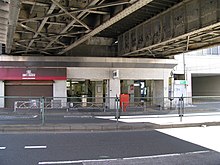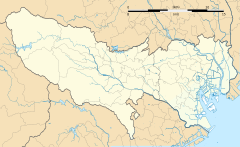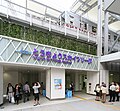Tokyo Skytree Station
TS02 Tokyo Skytree Station とうきょうスカイツリー駅 | |||||||||||||||||||||||||||||||||||||||||
|---|---|---|---|---|---|---|---|---|---|---|---|---|---|---|---|---|---|---|---|---|---|---|---|---|---|---|---|---|---|---|---|---|---|---|---|---|---|---|---|---|---|
 Station entrance in 2012 | |||||||||||||||||||||||||||||||||||||||||
| General information | |||||||||||||||||||||||||||||||||||||||||
| Location | 1-1-4 Oshiage, Sumida-ku, Tokyo Japan | ||||||||||||||||||||||||||||||||||||||||
| Operated by | |||||||||||||||||||||||||||||||||||||||||
| Line(s) | TS Tobu Skytree Line | ||||||||||||||||||||||||||||||||||||||||
| Other information | |||||||||||||||||||||||||||||||||||||||||
| Station code | TS-02 | ||||||||||||||||||||||||||||||||||||||||
| History | |||||||||||||||||||||||||||||||||||||||||
| Opened | 1902 | ||||||||||||||||||||||||||||||||||||||||
| Previous names | Azumabashi; Narihirabashi (until 2012) | ||||||||||||||||||||||||||||||||||||||||
| Passengers | |||||||||||||||||||||||||||||||||||||||||
| FY2012 | 105,199 daily | ||||||||||||||||||||||||||||||||||||||||
| Services | |||||||||||||||||||||||||||||||||||||||||
| |||||||||||||||||||||||||||||||||||||||||
| |||||||||||||||||||||||||||||||||||||||||
Tokyo Skytree Station (とうきょうスカイツリー駅, Tōkyō Sukaitsurī-eki, officially stylized as TOKYO SKYTREE Station) is a railway station on the Tobu Skytree Line in Sumida, Tokyo, Japan, operated by the private railway operator Tobu Railway.[1] It is adjacent to the Tokyo Skytree and Skytree Town redevelopment, and was formerly known as Narihirabashi Station.
Lines
Tokyo Skytree Station is served by the Tobu Skytree Line from Asakusa, and is 1.1 km from the line's Asakusa terminus.[2]
Station layout
The station consists of one island platform serving two tracks.
Platforms
| 1 | TS Tobu Skytree Line | for Asakusa |
| 2 | TS Tobu Skytree Line | for Kita-Senju, Ōmiya, Kasukabe, Tōbu-Dōbutsu-Kōen, Kuki, and Minami-Kurihashi |
-
Platform 2 looking east, May 2012
-
The station entrance in May 2012
Adjacent stations
All kinds of the limited express excluding Skytree Liner and Urban Park Liner stop at Hikifune Station as the next or previous station at only the morning and evening. At the noon, all of the limited express except Skytree Liner and Urban Park Liner stop at Kita-Senju Station as the next or previous station.
History


The station first opened on 1 April 1902 as Azumabashi Station (吾妻橋駅, Azumabashi-eki).[2] The station closed from 5 April 1904, but reopened on 1 March 1908.[2] On 1 March 1910, the station was renamed Asakusa Station (浅草駅, Asakusa-eki).[2] On 25 May 1931, this was renamed Narihirabashi Station (業平橋駅, Narihirabashi-eki).[2]
Redevelopment and renaming
Narihirabashi Station was renamed Tokyo Skytree Station from 17 March 2012, ahead of the opening of the Tokyo Skytree and adjoining Skytree Town shopping and office complex on 22 May 2012.[3] From this date, all up limited express (Spacia, Ryōmō, and Shimotsuke) services and four down Spacia Kinu services stop at the station.[3] The rebuilt and enlarged station was opened on 20 April 2012, with the concourse area increased from approximately 60 m2 to 700 m2.[4]
From the same day, station numbering was introduced on all Tobu lines, with Tokyo Skytree Station becoming "TS-02".[5]
On the 27 November 2022 a new elevated platform was opened for southbound trains headed for Asakusa Station.[6] This is part of the 2017-2024 project of elevating the tracks in order to eliminate a level crossing to the east of the SkyTree complex. The station is being elevated and relocated 150 meters to the east. Instead of one island platform with two tracks, the new station will have 3 tracks, an island platform and a side platform.[7]
Passenger statistics
In fiscal 2012, the station was used by an average of 105,199 passengers daily.[8]
Surrounding area
- Tokyo Skytree
- Sumida Aquarium
- Tobu Railway Head Office
Other stations
- Oshiage Station (
 Tokyo Metro Hanzōmon Line) (approximately 10 minutes' walk and 1 stop away on the railway)
Tokyo Metro Hanzōmon Line) (approximately 10 minutes' walk and 1 stop away on the railway) - Honjo-azumabashi Station (
 Toei Asakusa Line)
Toei Asakusa Line)
See also
References
- ^ "Narihirabashi Station Information" (in Japanese). Tobu Railway. Retrieved 28 December 2010.
- ^ a b c d e Terada, Hirokazu (July 2002). データブック日本の私鉄 [Databook: Japan's Private Railways]. Japan: Neko Publishing. p. 197. ISBN 4-87366-874-3.
- ^ a b 3月17日(土)伊勢崎線・日光線で一部ダイヤ改正を実施 [17 March Isesaki Line and Nikko Line Timetable Revision] (PDF). Tobu News (in Japanese). Japan: Tobu Railway. 26 January 2012. Retrieved 26 January 2012.
- ^ 「とうきょうスカイツリー駅」改装オープン [Rebuilt Tokyo Skytree Station opened]. Yomiuri Online (in Japanese). Japan: The Yomiuri Shimbun. 20 April 2012. Retrieved 20 April 2012.
- ^ 「東武スカイツリーライン」誕生! あわせて駅ナンバリングを導入し、よりわかりやすくご案内します [Tobu Sky Tree Line created! Station numbering to be introduced at same time] (PDF). Tobu News (in Japanese). Tobu Railway. 9 February 2012. Retrieved 27 May 2012.
- ^ "東武鉄道とうきょうスカイツリー駅付近「高架化」まず上り線、11月から" [Tobu Railway Tokyo Skytree Station to Open Elevated Platform for Inbound Trains in November]. news.railway-pressnet.com (in Japanese). 5 October 2022. Archived from the original on 6 October 2022. Retrieved 6 October 2022.
- ^ takuya), takuya870625(Umemoto. "とうきょうスカイツリー駅付近高架化工事(2021年4月24日取材) - Reports for the future ~未来へのレポート~". mirai-report.com. Retrieved 27 October 2023.
{{cite web}}: CS1 maint: numeric names: authors list (link) - ^ 駅情報(乗降人員) [Station information (Passenger statistics)] (in Japanese). Japan: Tobu Railway. Retrieved 10 January 2014.
External links
- Tobu station information (in Japanese)




